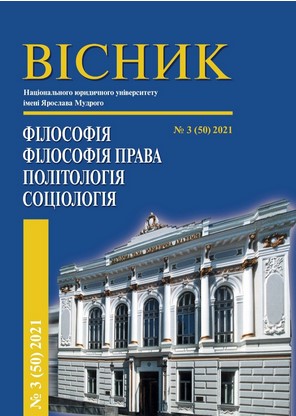ВІРТУАЛЬНА РЕАЛЬНІСТЬ: ДО ПРОБЛЕМИ КОНЦЕПТУАЛІЗАЦІЇ ПОНЯТТЯ
VIRTUAL REALITY: THE PROBLEM OF CONCEPTUALIZATION OF THE CATEGORY
Author(s): Olexander Petrovych Dzoban, Evgen Mykolayovych ManuilovSubject(s): Social development, ICT Information and Communications Technologies, Globalization
Published by: Національний юридичний університет імені Ярослава Мудрого
Keywords: virtualization; virtual reality; eidos; virtual space; simulation;
Summary/Abstract: The article shows that the development of modern society under the influence of globalization of information processes, the leading manifestation of which is the formation of a new information space. Total penetration of information technologies leads to the fact that in modern society the relationship between people is becoming more and more virtual. Virtualization touches all spheres of human life, turning from a simple technology in the information-communicative environment. Today the extension of its influence flows in interpenetrating two main directions: increasing the impact of virtuality in the real world and the virtualization of reality itself. These processes are manifested in the acquisition of the virtual status of all aspects of the subjective world of man and of sociocultural reality. Under the influence of virtual communication are changing the consciousness of the individual, an emerging network mindset and existence. These changes significantly affect not only the individual but also on the behavior of society as a whole. It is proved that the basis for the understanding of the concepts of «virtuality» and «reality» were laid in antiquity. Ancient thinkers in the definition of «virtual» came from the driving force of the mind (Plato, Aristotle, Cicero). The conclusion is that already the ancient interpretation of virtual focuses on the change of the human psyche under the influence of something specific and unusual, that is to be in virtuality means to leave everyday life and another way of looking at reality by changing consciousness, using their hidden potential. It is shown that in scholastic philosophy the virtual value is considered in the context of the analysis of the status of the individual as part of a shared. In modern times, the filling content of the «virtual» with subtle differences, interpretations. In the twentieth century the phenomenon of the «virtual» received new possibilities and impulses for development. The technological revolution has led to the expansion of the scope of the term «virtual reality». The phenomenon of virtual reality has been widely discussed after the introduction of this term in the sphere of high technologies. This gave impetus to perform research in many fields of knowledge, to confirm the existence of virtuality long before it became apparent and decorated in a computer embodiment. Briefly analyse the point of view of philosophers-postmodernists.
Journal: Вісник НЮУ імені Ярослава Мудрого. Серія: Філософія, філософія права, політологія, соціологія
- Issue Year: 35/2017
- Issue No: 4
- Page Range: 21-31
- Page Count: 11
- Language: Ukrainian

